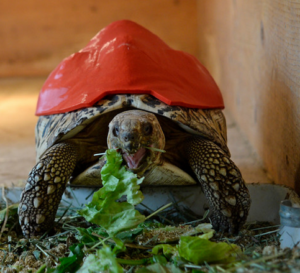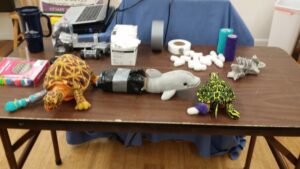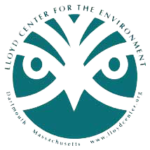Engage Your Students in the 2023 STEM Challenge:
Engineering Design Challenge: Animal Adaptations and Bioengineering
Join the Wade Institute for Science Education and our collaborating partners, the Lloyd Center for the Environment and Buttonwood Park Zoo, for our 2023  STEM Challenge! Engineering Design Challenge: Animal Adaptations and Bioengineering will engage students in grades 5-8 in a unique experience that integrates science and engineering concepts in a series of inquiry-based investigations that lead up to a student-driven Challenge. Students will be divided into small teams and presented with a scenario that asks them as a team of engineers to design a prosthetic device for an injured animal to help it survive. The loss of limbs or anatomical body parts of wild and marine animals can occur as a result of injury, birth defects or diseases. Prosthetics are artificial devices created by humans to replace the injured or missing anatomical structure such as limbs, beaks, tails, fins, shells, etc. The teacher will choose from two scenarios – one for terrestrial wildlife and one for marine animals. The Challenge includes a curriculum packet with background information, investigations to use to prepare students for the Challenge and an educators’ workshop to help teachers’ prepare to implement the Challenge in their classroom. Collaborating partners are the Wade Institute for Science Education, the Lloyd Center for the Environment and Buttonwood Park Zoo. Elementary and high schools are welcome to participate in the Challenge.
STEM Challenge! Engineering Design Challenge: Animal Adaptations and Bioengineering will engage students in grades 5-8 in a unique experience that integrates science and engineering concepts in a series of inquiry-based investigations that lead up to a student-driven Challenge. Students will be divided into small teams and presented with a scenario that asks them as a team of engineers to design a prosthetic device for an injured animal to help it survive. The loss of limbs or anatomical body parts of wild and marine animals can occur as a result of injury, birth defects or diseases. Prosthetics are artificial devices created by humans to replace the injured or missing anatomical structure such as limbs, beaks, tails, fins, shells, etc. The teacher will choose from two scenarios – one for terrestrial wildlife and one for marine animals. The Challenge includes a curriculum packet with background information, investigations to use to prepare students for the Challenge and an educators’ workshop to help teachers’ prepare to implement the Challenge in their classroom. Collaborating partners are the Wade Institute for Science Education, the Lloyd Center for the Environment and Buttonwood Park Zoo. Elementary and high schools are welcome to participate in the Challenge.
Students will be given the following Challenge:
Your team of engineers specializes in creating prosthetics for injured animals. You have been hired by a local organization that provides this service and need to create a prototype for the injured animal.
Teachers will choose one of these two scenarios:
 Terrestrial Wildlife: A Wildlife Biologist has discovered an (animal) in the local (habitat) that has a deformation that is affecting its ability to survive. The Biologist has asked your team of engineers to create a prosthetic to help (insert animal) survive in the wild. Your Challenge is to create a prototype of the prosthetic you will use to help (animal) survive. Examples of deformations may include an eagle whose beak is damaged, an elephant with a deformed leg, an owl missing a wing, a mountain goat missing a hoof, or a squirrel with no tail.
Terrestrial Wildlife: A Wildlife Biologist has discovered an (animal) in the local (habitat) that has a deformation that is affecting its ability to survive. The Biologist has asked your team of engineers to create a prosthetic to help (insert animal) survive in the wild. Your Challenge is to create a prototype of the prosthetic you will use to help (animal) survive. Examples of deformations may include an eagle whose beak is damaged, an elephant with a deformed leg, an owl missing a wing, a mountain goat missing a hoof, or a squirrel with no tail.
Marine Wildlife: A local Marine Biologist has discovered an (animal) that has a deformation that is affecting its ability to survive. The (animal) is currently at the local aquarium. The Biologist has asked your team of engineers to create a prosthetic to help (animal) survive in the wild so that it can released back into the wild. Your Challenge is to create a prototype of the prosthetic you will use to help (animal) survive. Examples of deformations may include a dolphin missing a tail, a sea turtle missing a flipper or with a broken shell, a duck with a damaged beak, or a penguin missing a foot.
The Challenge will include:
- A Professional Development session for educators planning to implement the Challenge in their classrooms. (optional)
- A Curriculum Guide providing background information and inquiry-based investigations that can be used to lead up to the Challenge.
- A materials kit for implementing the Challenge in your classroom. (Massachusetts schools only)
 At the end of the Challenge students will present their models to their peers, and invited guests, such as representatives of the participating STEM businesses, members of the STEM Advisory Council and educators/staff from the partner organizations. They will choose a presentation type such as a demonstration, video, storyboard, puppet show or skit to present their work. Their work will also be displayed on the social media platforms of the participating organizations and there may be opportunities to display their work at both the Lloyd Center and the Buttonwood Park Zoo.
At the end of the Challenge students will present their models to their peers, and invited guests, such as representatives of the participating STEM businesses, members of the STEM Advisory Council and educators/staff from the partner organizations. They will choose a presentation type such as a demonstration, video, storyboard, puppet show or skit to present their work. Their work will also be displayed on the social media platforms of the participating organizations and there may be opportunities to display their work at both the Lloyd Center and the Buttonwood Park Zoo.
The Curriculum Guide includes information and materials that will assist participants in designing and creating the prototype prosthetic.
The 6-hour Professional Development workshop will be offered in two formats: a full day in-person workshop at Buttonwood Park Zoo or a virtual workshop consisting of two 3-hour virtual sessions. During the workshop teachers will participate in the pre-Challenge investigations as well as the Challenge. The professional development opportunities will include extension resources they can use with their students before or after the design Challenge.
Help your students rise to the MA STEM Week theme “See Yourself in STEM” as they use their STEM skills and creativity to meet the Challenge. MA STEM Week and the STEM Design Challenges are funded by the MA Advisory Council.
Registration Information:
Please note: While we welcome out-of-state participants to join in this Challenge, we will not be able to provide non-Massachusetts educators with a materials kit. The Curriculum Guide will be available for any teachers participating in the Challenge.
Cost: FREE
In-person Workshop: Saturday, September 30th, 2023 (9:00 AM – 3:00 PM ET), Buttonwood Park Zoo, New Bedford, MA
Virtual Workshop: Thursday, September 21st AND Thursday, September 28th, 2023 (3:00 PM – 6:00 PM ET)
Challenge Partners: Lloyd Center for the Environment; Buttonwood Park Zoo
Registration for the 2023 STEM Week Challenge is now closed.
STEM Week (October 16th – 20th) is sponsored by the Executive Office of Education and the MA STEM Advisory Council.
The STEM Challenge is funded by a grant from the MA STEM Advisory Council.
The theme for the 2023 Massachusetts STEM Week is “See Yourself in STEM”. For more information on STEM Week, visit www.massstemweek.org.



